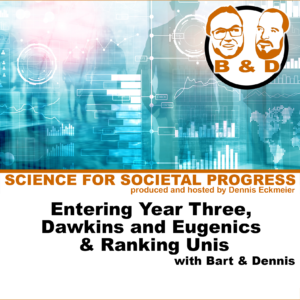Podcast: Play in new window | Download (Duration: 40:45 — 19.2MB)
Subscribe: Google Podcasts | RSS | More

This episode marks the official end of the second year of this podcast! (unfortunately, there was still no present for Bart – consider becoming a Patron to help!) Apart from the plans for year 3, Bart & Dennis discussed the hot topic of the week: a provocative tweet by Richard Dawkins on Eugenics, and the dos and don’ts, and pros and cons of university rankings.
AN AMBIGUOUS(?) TWEET
Richard Dawkins (a famous evolutionary biologist and member of the royal society) tweeted that, while he deplores eugenic practice, ”it” would still “work”, as “it” would work in farm animals and pets – as if breeding animals was the same as eugenics.
His tweet – as you have probably guessed – led to a heated debate on eugenics. And geneticists joined the uproar arguing that breeding would not even work in humans: all inbreeding (animals or crops) leads to genetic weakness – just look at pugs! Or the Lannister family!
Bart acknowledges that certain opinions based on science are offensive to certain groups. But how could we communicate such opinions? Especially on a platform like Twitter? Regularly, the lives of people at the center of outrage are affected negatively.
In the end, you can’t separate a term like eugenics from its fascist ideology. And if you make divisive tweets, you must expect a strong reaction.
EVALUATING UNIVERSITIES
Bart and Dennis compare two very distinct ways of ranking universities, and they discuss whether such a ranking is useful at all – or possibly even harmful.
On the one hand, there is “Nature Index” by nature publishing group. It ranks institutes based on the number of papers published in a selected set of journals and by how often these papers are shared with authors from other institutes (as a measure of collaboration).
Dennis points out that the journals considered are subjectively selected by an undisclosed number of scientists with undisclosed affiliations. The selection is further restricted to journals listed on Web of Science, a database that excludes many journals described as “local” – mostly journals that don’t publish in English, or simply aren’t “Western”.
It also comes at no surprise that more than 20% of the journals considered by Nature Index are publications of nature publishing group.
At least they didn’t use the Journal Impact Factor – you would say – but is this better?
On the other hand, there is the NGO “CHE” (Centrum für Hochschulentwicklung – which Dennis would translate to Centre for the Development of Higher Education) who rank Universities in German-language-areas. Their criteria are very different: they look, for example, at the job prospects of graduates, the facilities at the university (gym, library, dorm), and even at the town and the general quality of life.
High school graduates looking for a place to live and study are certainly better served with a CHE-kind of ranking than with the publication-based Nature Index. Having more research funding may not reflect the quality of life and education. Bart argues that he never even used a ranking system to choose where to study – he went for the best party location! And, on a more serious note, Bart and Dennis agreed that rankings, in general, may not only serve as an indicator for how an institution could improve, they could also give unhelpful incentives to publish in certain journals and intensify “money makes money” funding biases.
PLANS FOR YEAR 3
As per usual, the interview episodes on big science, science communication, and academia will of course continue. Interviews are recorded – or at least planned – up until summer!
For the talk episodes, we will try something new: “Bart & Dennis Against Humanities”. Both biologists with PhDs in neuroscience, they want to explore the strange world of the Humanities, and learn about their research! What is the science of naming things? How does it work? WHY!? They want to invite twelve researchers from obscure (sounding) fields in the humanities for interviews! That should be fun!
Do you have questions, comments or suggestion? Email info@scienceforprogress.eu, write us on facebook or twitter, or leave us a video message on Skype for dennis.eckmeier.
But, wait! There is more! Dennis is working to get another series running: 12 episodes on “Scientists for Future”, a group of scientists founded in support of the “Fridays for Future” climate protests. Dennis has started to reach out to their contacts – let’s see where this is heading.
We are therefore moving from two episodes a month to three. But three is weird. Because of that, Dennis also plans to publish the extended version of the 12 most popular episodes of the podcast, which so far had only been available on Patreon!